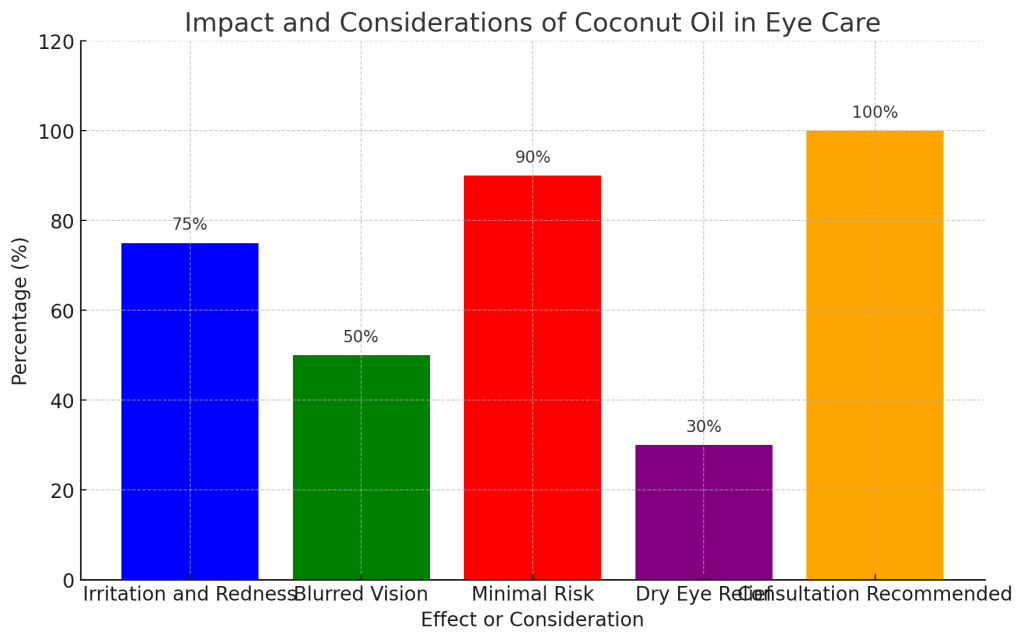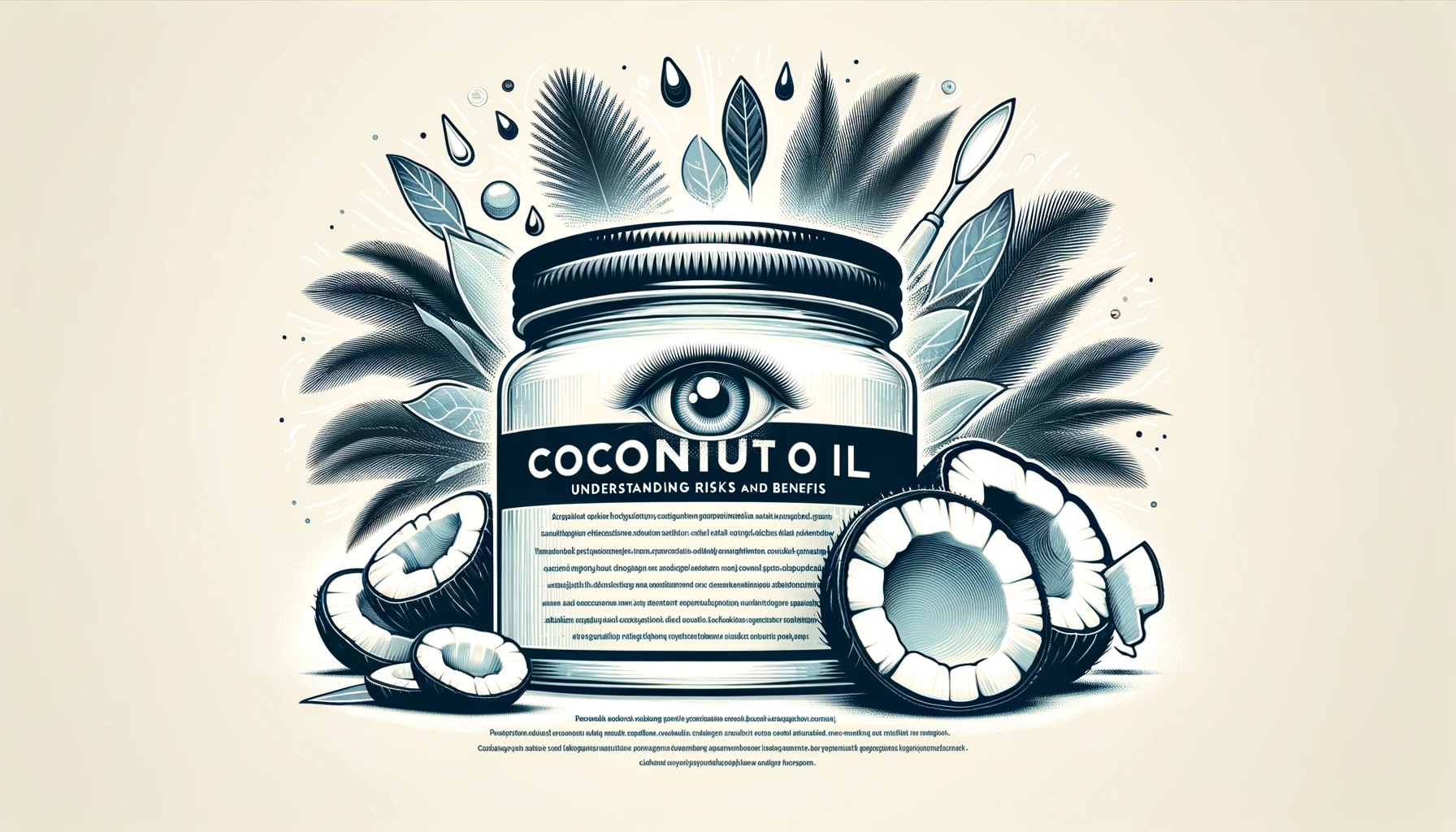Key Takeaways Table
| Aspect | Details |
|---|---|
| Main Topic | Effects of Coconut Oil in the Eyes |
| Safety | Coconut oil is generally non-toxic and has antiseptic properties. |
| Common Effects | Can cause irritation, blurry vision, or faint vision; effects vary based on the oil’s properties. |
| Risk Level | Minimal risk for most people, but reactions can vary. |
| Immediate Action | Flush eyes with water or use a damp cloth to remove the oil. |
| Potential Benefits | May help reduce dry eye irritation but lacks human studies. |
| Professional Advice | Consult a doctor or ophthalmologist for personalized advice. |
Coconut oil, known for its versatility and health benefits, is a staple in many households. Its applications range from cooking to skin and hair care. But what happens when this seemingly harmless substance gets into your eyes? This article delves into the effects of coconut oil on your eyes, providing essential information for anyone using this natural product.
What to Expect When Coconut Oil Enters Your Eyes
Immediate Reactions and Risks
When coconut oil inadvertently enters the eyes, it can lead to various immediate reactions. The most common effects include:
- Irritation and Redness: The oil can cause discomfort and redness in the eyes.
- Blurred or Faint Vision: Some individuals might experience blurry or faint vision due to the oil’s consistency, which can interfere with normal eye function.
- Minimal Risk for Most People: Generally, the risk associated with getting coconut oil in the eyes is low, but individual reactions can vary significantly.
Dealing with Coconut Oil in the Eyes
If you find yourself in this situation, follow these steps:
- Rinse Thoroughly: Flush your eyes with water immediately to remove the oil.
- Avoid Rubbing: Rubbing your eyes can spread the oil further and exacerbate irritation.
Long-Term Implications and Safety Measures
Is Coconut Oil Safe for Your Eyes?
While coconut oil is largely considered safe due to its non-toxic nature, its suitability for the eyes is less clear-cut:
- Dry Eye Treatment: Some suggest coconut oil might help alleviate dry eye symptoms, but there is a lack of human studies to support this claim.
- Varied Individual Reactions: People’s reactions to coconut oil in the eyes can range from negligible to severe irritation.
Professional Consultation
Given these uncertainties, it’s advisable to consult a healthcare professional, especially an ophthalmologist, before using coconut oil as a remedy for any eye-related issues.
Connection with Expired Coconut Oil
It’s crucial to consider the quality and state of the coconut oil used. Expired coconut oil might have different properties affecting its impact on the eyes. For detailed insights into the effects of expired coconut oil on your skin and hair, explore these resources:
- What Happens if You Use Expired Coconut Oil on Your Skin?
- General Impact of Using Expired Coconut Oil
- Effects of Expired Coconut Oil on Hair
Continuing from where we left off, let’s delve deeper into the various aspects of coconut oil’s interaction with the eyes and expand on related topics to provide a comprehensive understanding.
Precautions When Using Coconut Oil Near the Eyes
Choosing the Right Type of Coconut Oil
Not all coconut oil is created equal, especially when it comes to eye safety. Consider these factors:
- Purity: Opt for pure, unrefined coconut oil as it is less likely to contain irritants.
- Temperature: Warm coconut oil can be more irritating than cool oil, so be cautious with its temperature.
Application Tips for Eye Safety
- Avoid Direct Contact: When applying coconut oil near the eyes, such as on eyelids or lashes, take care to prevent direct contact with the eye itself.
- Clean Hands and Applicators: Ensure that your hands and any applicators used are clean to avoid introducing bacteria into the eye area.

The Role of Coconut Oil in Eye Care
Potential Benefits
Despite the lack of extensive research, some potential benefits of coconut oil for eye care include:
- Moisturizing Properties: Coconut oil might help in moisturizing the sensitive skin around the eyes, potentially reducing the appearance of fine lines.
- Natural Makeup Remover: It can be an effective, gentle makeup remover that doesn’t harshly affect the delicate eye area.
Limitations and Concerns
- Lack of Scientific Evidence: There’s a significant gap in clinical research regarding the efficacy and safety of coconut oil for direct eye care.
- Individual Allergies: Some people may be allergic to coconut oil, which can lead to more severe reactions if it gets into the eyes.
Connecting to Broader Coconut Oil Uses
Coconut Oil in Beauty and Health Regimens
Coconut oil is a popular ingredient in many beauty and health products. Its uses extend beyond eye care to include:
- Hair Care: Widely used for its nourishing properties in hair care, coconut oil can improve hair health and shine.
- Skin Care: Known for its moisturizing effects, it’s commonly used in skin care routines for hydration and nourishment.
The Importance of Quality and Expiration
As mentioned earlier, the quality and state of coconut oil can significantly impact its effect on the eyes. This point is crucial in understanding the broader scope of coconut oil’s applications. Readers are encouraged to explore related articles on the effects of using expired coconut oil:
Continuing with our exploration of the interaction between coconut oil and eye health, let’s delve into some additional aspects that could be of interest to those using coconut oil for beauty or health purposes.
Alternative Uses of Coconut Oil for Eye Health
Eyelash and Eyebrow Care
- Nourishing Eyelashes: Coconut oil is often used as a natural remedy to nourish and strengthen eyelashes, potentially promoting growth.
- Eyebrow Conditioning: Similarly, it can be applied to eyebrows for conditioning and to encourage thicker growth.
Precautions for Sensitive Eyes
- Patch Test: For those with sensitive eyes, it’s advisable to conduct a patch test before applying coconut oil around the eye area.
- Dilution with Carrier Oils: If pure coconut oil is too strong, consider diluting it with a milder carrier oil to reduce the risk of irritation.
The Debate Over Coconut Oil’s Safety in Eye Care
Supportive Views
- Natural Alternative: Proponents of coconut oil in eye care value its natural, chemical-free composition compared to commercial eye care products.
Opposing Views
- Risk of Contamination: Critics argue that coconut oil, being an organic compound, can easily become contaminated, posing a risk of eye infection.
- Inconsistency in Quality: The lack of standardization in coconut oil production can lead to variations in quality, affecting its safety and effectiveness in eye care.
Integrating Coconut Oil into a Holistic Health Regimen
Beyond Eye Care: The Versatility of Coconut Oil
Coconut oil’s benefits are not limited to eye health; its holistic applications include:
- Digestive Health: Used in cooking, coconut oil can aid digestion and boost metabolism.
- Oral Hygiene: Oil pulling with coconut oil is believed to promote oral health and hygiene.
Complementary Practices for Eye Health
- Balanced Diet: Incorporate foods rich in vitamins A, C, and E, which are crucial for eye health.
- Regular Eye Exams: Regular check-ups with an eye care professional can help identify and address any eye health issues early on.
Final Thoughts and Further Reading
In summary, while coconut oil has a multitude of uses and benefits, its application in and around the eyes should be done cautiously. Its versatility in beauty, health, and cooking makes it a valuable addition to many people’s daily routines, but always consider individual reactions and consult healthcare professionals for personalized advice. For more insights into the diverse applications of coconut oil, explore our comprehensive guide:

